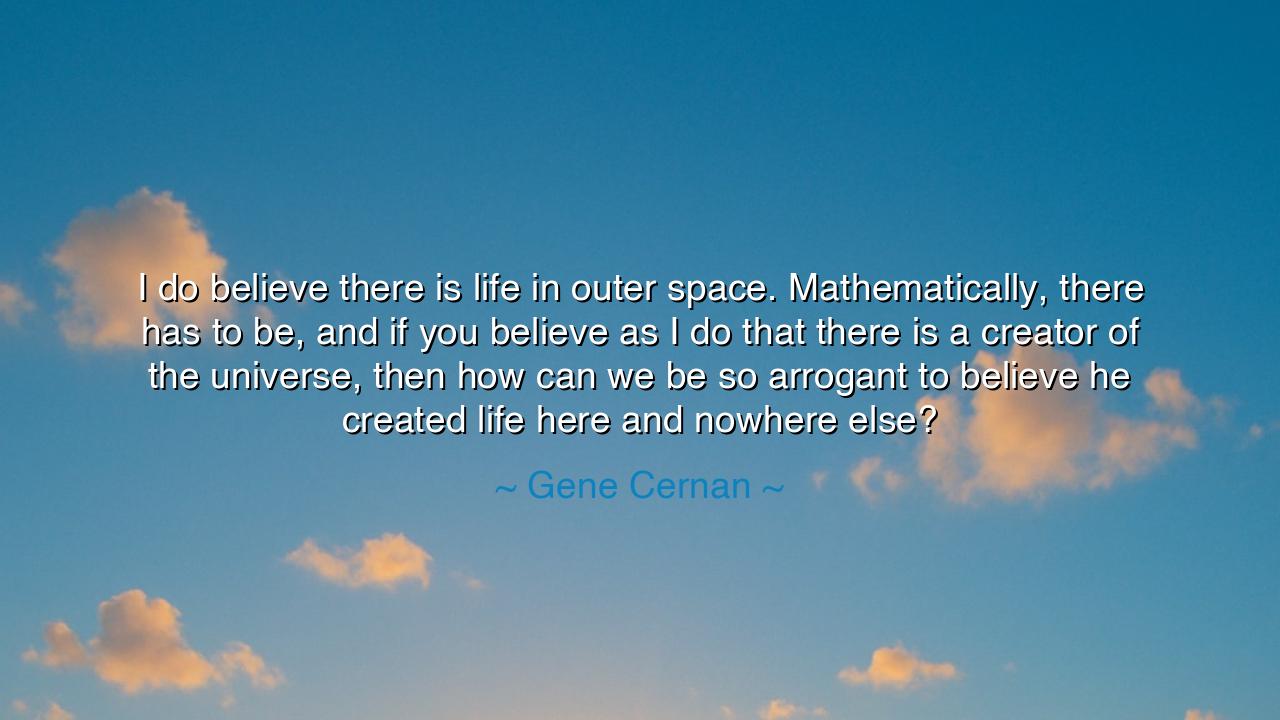
I do believe there is life in outer space. Mathematically, there
I do believe there is life in outer space. Mathematically, there has to be, and if you believe as I do that there is a creator of the universe, then how can we be so arrogant to believe he created life here and nowhere else?






In the vastness of the cosmos, where stars burn like ancient beacons and planets drift in the silence of space, there lies a question that has haunted humanity for ages: are we truly alone? Gene Cernan, one of the last men to walk on the moon, gave voice to this question when he said: "I do believe there is life in outer space. Mathematically, there has to be, and if you believe as I do that there is a creator of the universe, then how can we be so arrogant to believe he created life here and nowhere else?" These words carry the weight of profound humility and curiosity—the recognition that, in a universe so vast, the very notion that life could exist only on Earth seems not just improbable, but arrogant.
Consider, O seekers of wisdom, the ancient philosophers and dreamers who looked to the heavens and asked similar questions. The Greeks, with their gods and stories of beings from beyond the Earth, believed in the possibility of life beyond the stars. Plato, that master of reason, thought of the cosmos as a grand design, an ordered universe governed by principles of harmony and balance. Aristotle, though grounded in the belief that the Earth was the center of the universe, still acknowledged the immensity of the heavens and the possibility of other worlds. In their own ways, they were both humbled by the vastness of the sky and driven by the same desire to understand the mysteries of the universe. Cernan, like the philosophers of old, challenges us to expand our minds beyond the familiar, to open our hearts to the idea that the Creator’s work might not be confined to the Earth alone.
In the journey of human exploration, there have always been those who dared to look beyond the boundaries of their own existence. Think of the great explorers, such as Christopher Columbus, who, in his time, believed the world was vast, but there were lands unknown to his contemporaries. He did not find a new world because he was certain of its existence, but because he dared to question and to sail into the unknown. Similarly, Cernan’s words echo that same spirit of exploration—a belief that, if the universe is indeed the work of a divine creator, then surely that creator did not limit life to our tiny world alone. Cernan, much like Columbus, was an explorer, but his exploration was not of new lands on Earth, but of the very nature of existence itself.
Mathematics, that ancient and eternal language of the universe, is the key that unlocks this riddle. The probability of life existing elsewhere in the universe is not a matter of hope or faith, but of numbers—of ratios, of patterns, of calculations that show us the vast potential for life beyond our understanding. In ancient times, Pythagoras looked to numbers to understand the nature of the world, believing that the universe itself was governed by harmonious mathematical laws. Today, Cernan’s belief in the existence of life elsewhere in the cosmos is grounded in the same reasoning—the sheer immensity of the universe, with billions of stars and even more planets, makes it mathematically inevitable that life exists elsewhere. To believe otherwise would be to deny the vastness of creation itself.
Yet Cernan’s words also carry a spiritual weight, a recognition of the Creator who is beyond our comprehension. For those who believe in a divine force shaping the universe, the question becomes not whether life exists elsewhere, but why would we, in our arrogance, assume that the Creator’s work is limited to Earth? This thought calls to mind the great religious philosophers of the past, such as Thomas Aquinas, who believed that God’s creation was boundless, not confined to the limits of human understanding. The idea that life exists beyond our planet does not diminish the sacredness of Earth, but instead enhances the beauty of the Creator’s work, suggesting a universe far richer and more complex than we could ever imagine.
O children of the Earth, the lesson here is one of humility and curiosity. Just as Cernan gazed upon the vast expanse of space and dared to believe that we are not alone, so too must we look beyond the limits of our own understanding. To be human is to question, to explore, and to wonder about the world around us—and beyond it. The stars and the planets are not merely distant points of light, but beacons of possibility, reminders that our understanding is always incomplete, that there are always more mysteries to uncover, more worlds to explore.
So, take Cernan’s words to heart, O seekers of truth: do not let arrogance limit your vision. The universe is vast, and the possibility of life beyond Earth is not a matter of belief, but of reason. We are part of a greater cosmic story, and to understand our place within that story, we must look not only to the Earth but to the stars. The quest for knowledge is not just about discovering new worlds, but about deepening our connection to the universe and to the divine Creator who has made it all. Let this quest fill your heart with awe, and may it lead you to a greater understanding of the infinite possibilities that await us in the stars.






AAdministratorAdministrator
Welcome, honored guests. Please leave a comment, we will respond soon